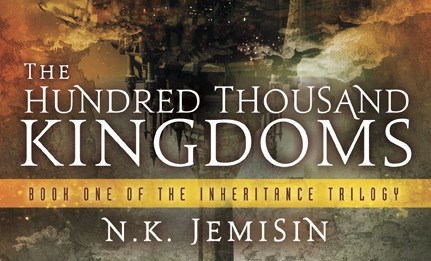The most famous black sf/fantasy writers, Samuel Delany and Octavia Butler, are both on the high art end of the genre, leaning towards literary fiction, feminist utopia, and high art bona fides. Their peers are people like Joanna Russ, Urusla Le Guin, and Philip K. Dick, rather than, say, the solidly middle-brow Neil Gaiman or page turning sci-fi young adult fare like the Hunger Games.
N.K. Jemisin’s novel The Hundred Thousand Kingdoms is more in the Gaiman/Hunger Games camp; there is plot, there is a heroine, there is little in the way of complicated semiotic play, body horror, or high concept. To the extent that there is genre drift, it’s not towards literary fiction, but towards romance. You don’t have to squint much to see that, Nahodeth, the Night Lord, the most powerful being in the universe, is a dead ringer for Edward, and Christian Grey, and all those other wounded, violent, seductive super-patriarchs who hold out the promise of apocalyptically violent, yet mystically safe, romps/relationships. There’s even a bed-breaking scene a la the one in the last volume of Twilight (Jemisin might even have been directly inspired by Twilight; the timing seems about right.)
This isn’t to denigrate Jemisin’s book; I like Twilight quite well, as regular readers know, and while this isn’t as weird as Meyer’s book, its substantally better prose makes up for that to a good degree. The bed-breaking scene is cute, and in general the novel does what it sets out to do—which is to say, it bounces along at a readable clip, providing an enjoyably imagined world and a suitably fleshed out and determined heroine.
The novel is also concerned, in various ways with race. As we’ve mentioned a time or two on the blog, race in some genres, like superheroes, can be an extremely thorny issue to navigate.Even black creators often have a very difficult time incorporating black heroes in a meaningful way into superhero comics, as James Lamb has argued. Category fantasy has been perhaps even more overwhelmingly white in terms of creators and protagonists than the superhero genre has been. Given that history, and given Jemisin’s determination to write a category fantasy, rather than (like Butler or Delany) a meditation and subversion of the genre, you might expect some strain. Black superheroes are a mess; why should black fantasy heroes be any different?
But, at least in Jemisin’s handling, they are. Fantasy allows you of course to build entirely new worlds and cosmologies, and Jemisin uses that freedom to create an a reality in which race functions differently than, but with meaningful parallels to, our globe. Yeine Darr, the heroine, is from a backwater; she’s the child of the heir to the throne who gave up her legacy to marry a barbarian. Since she’s from the periphery, and because of her mother’s betrayal, Yeine is stigmatized. She’s also black—and while being black doesn’t function exactly the way it does in the modern U.S., it is still part of why she’s marginalized among the ruling Arameri, who are pale-skinned. Without much fuss, then, Jemisin manages to do what has so often eluded X-Men writers; she metaphorically references a history of anti-blackness without whitewashing it.
So what about fantasy’s white supremacist take on good and evil. Creators like Tolkien and C.S. Lewis linked virtue to a white British identity, casting the enemy as dark-skinned and/or, in Lewis’ case, as Muslim in all but name. Defenders of order and light fight the chaos of the dark; that’s how fantasy works — much like, not coincidentally, superhero stories.
Superhero stories have an awful lot of trouble switching around that law and order logic. But Jemisin inverts it almost casually. In her world, the evil is the white god of order, Itempas, who has enslaved his dark sibling, Nahadoth, god of chaos, and therefore of creation. The link between whiteness and enslavers is certainly not accidental. Nor is Yeine’s rumination, upon witnessing a particularly painful piece of hypocrisy:
This was the sort of thing that made people hate the Arameri—truly hate them, not just resent their power or their willingness to use it. They found so many ways to lie about the things they did. It mocked the suffering of their victims.
That’s pretty obviously a quote not just about bone-white Arameri self-delusions, but about Anglo-white American-European self-delusions. And again, those self-delusions are not necessarily the same, but are parallel enough to resonate—and not to themselves mock the suffering of victims by, for example, making a fantasy in which the bone-white ones are the main victims of slavery.
Again, Jemisin makes this all seem easy; why not have a black protagonist? Why not have a fantasy world very different from ours in which black historical experience, rather than white supremacist fantasy, remains recognizable? Part of the deftness is certainly due to Jemisin’s skill. But I think the fantasy genre itself deserves at least a bit of the credit. Imagining another world gives you more flexibility in dealing with race than the demand to imagine heroes operating in a world similar to ours, which they are not allowed to change.
______
Update: I actually talked to N.K. Jemisin for a separate interview, and she very kindly and gently told me I had misidentified the races here. The sun God is black; the god of darkness is white, and Yeine is half white and half Incan, or something close to Incan.
It doesn’t really change the thesis here very much I don’t think, but interesting for the way reader responses or visualizations can differ. Especially since a number of people who have read the books talked to me about this piece, but nobody else seems to have caught the errors either.

